In India, repair is ubiquitous and it is cheap. There is always a repairer at the street corner or on the footpath or under a tree or even under staircases. Of course, there are repairers with shops or stalls or mobile carts.
The informal sector provides earnings for an overwhelming majority of the skilled population but it fails to provide social security. During the lockdown, many of us would have quietly shifted to work from home. But in the informal sector, it was a crisis from the first day as they were being robbed of their basic right to work on the street.
Were the people in the informal sector waiting for the government to rescue them? Obviously not. Informal workers devised common sense strategies to survive; strategies that may not qualify as lessons in a management course. Here are a few such stories heard from personal accounts.
Wheels of the gig economy
Survival strategies were based on very keen observations of the ground realities as the lockdown was unfolding. Householders were actually afraid to go out and preferred doorstep services. The exodus of labour created opportunities for sundry jobs like loading-unloading, painting and urgent repairs works.
Sridhar Jayaram resorted to selling vegetables on his moped for 6 to 7 months after the lockdown period. Sridhar otherwise is trained as a tailor and carries his sewing machine on his moped to reach his customers on call basis. Business was good and he earned more than Rs 1000 a day. Selling vegetables was unfamiliar to him. Waking up early and going to K R Puram market to buy vegetables and selling them in the neighbourhood was a physically demanding job. In spite of all the hard work, he earned a meagre Rs 300 to Rs 400 per day. It was not enough.
Read more: How can one ensure fair rights for workers in the gig economy?
Balamurugan did sundry jobs of painting and loading-unloading to earn something during the lockdown period although he has a shop at Banashankari 2nd Stage where he makes and repairs steel almirahs. He managed his monthly expenses by taking small loans at 5 per cent interest from local moneylenders. But lockdown put paid to his ambitions. Today his business is struggling as people are scared to come to him because of the fear of COVID.
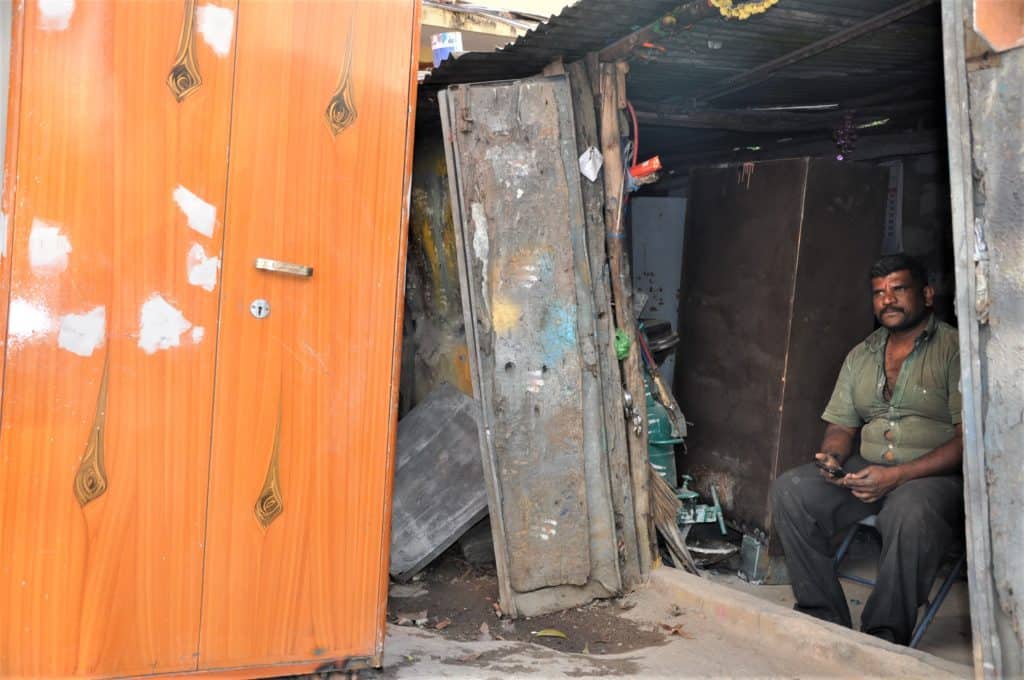
Adapt to survive
The lockdown led to a change of demand in types of repair services.
Suresh, a cobbler in upmarket Indiranagar, has occupied the same space on the street for the last 10 years. He provides cobbling services and refurbishes old shoes to make a living.
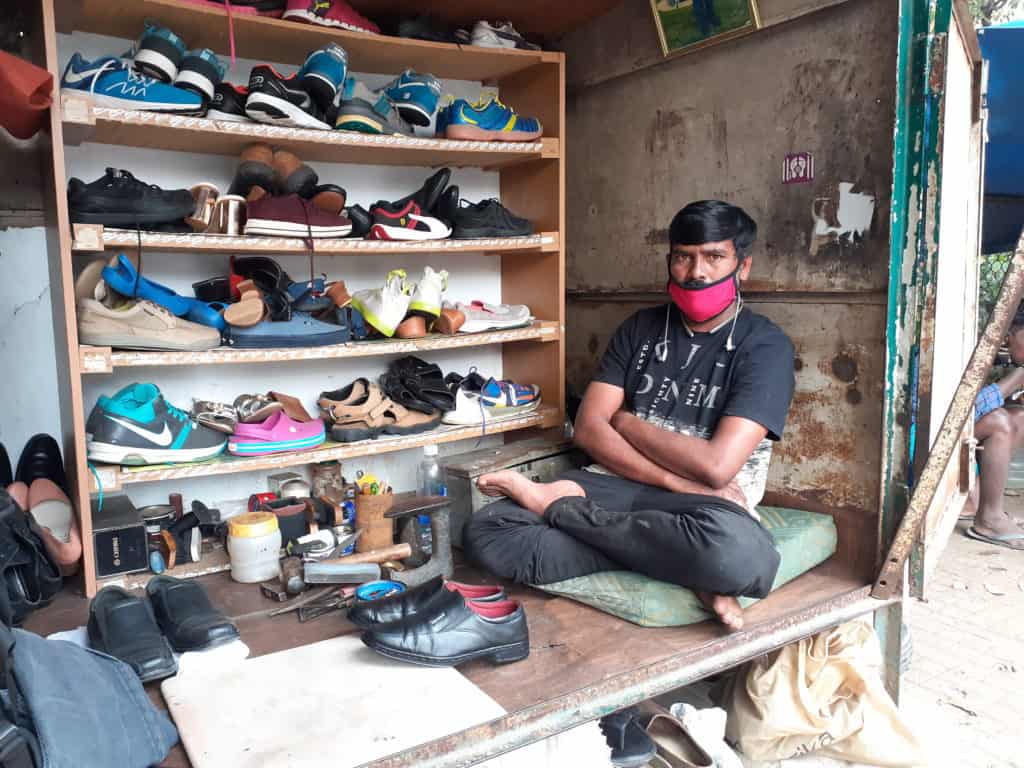
During the lockdown, demand for refurbished black shoes came down as his cherished customers, mainly restaurant staffers, were not buying. They were either not going to work or had left the city. At the same time, he saw potential in taking up repair and maintenance of sofas and other home furniture. He says people are caught in their homes so the furniture is being used more.
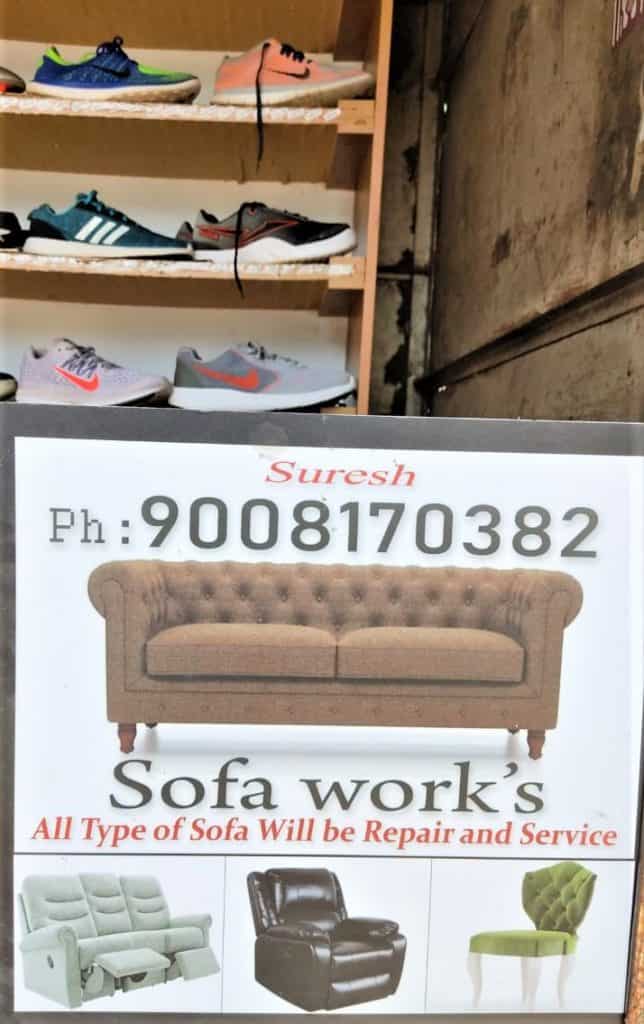
Kodandaraman works as an electrician cum mechanic with Shirish Auto in Marathahalli. During the lockdown, his income from the regular job dwindled and the salary became irregular. But he found some monetary relief by attending to small repairs and urgent electrical jobs like house wiring, office wiring, electrical maintenance of electrical equipment like power backup etc.
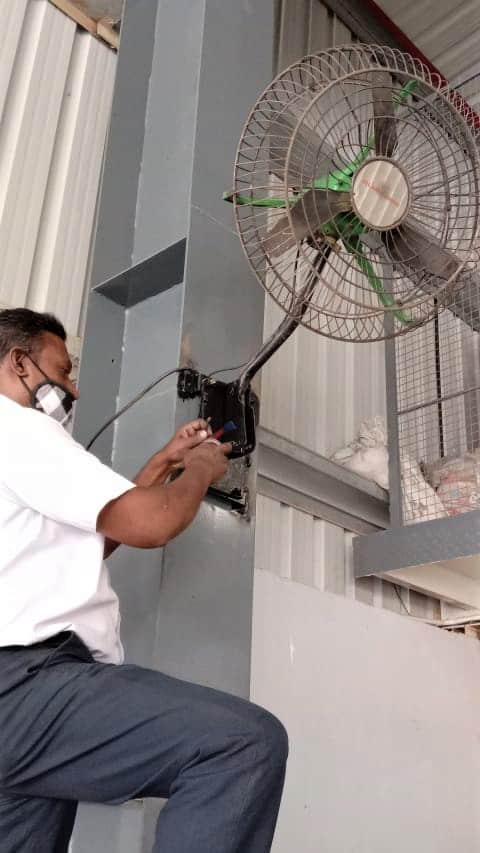
Prioritising basic needs
Among the informal workers, concern for paying rent and bringing food to the table were of primary importance. Children’s education took the worst hit.
Sridhar continued to go to his customers in spite of apprehensions about COVID. He was trying to improve his earnings. He is fending for a family of six and also has to pay rent, cable bills and electricity bills. He resorted to taking loans from a neighbour at 3% interest.
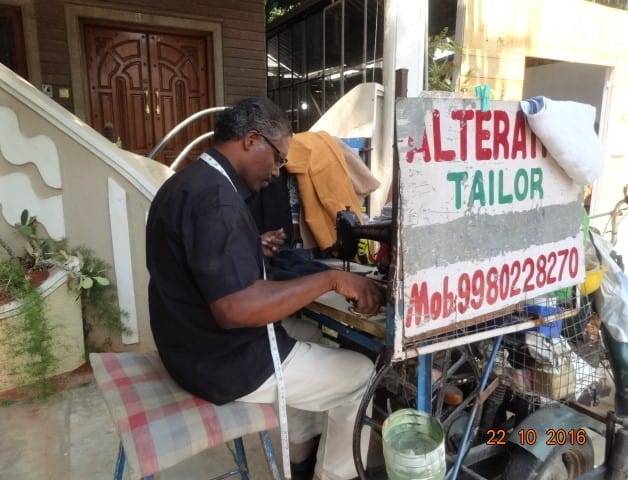
Suresh the cobbler had admitted his daughter in a private school in K R Puram. During the lockdown, classes were held up for 5 to 6 months after which online classes began. Suresh had to pull his daughter, who was in 3rd standard, out of school. The school demanded the full fee of Rs 30,000. He points out that classes were not held for half the year, so why pay for the whole year. Also, He observed that he was paying for the children to go to school so that he can focus on earning a livelihood.
Read more: School fee issue: More questions than answers
Kodandaraman the electrician, was not able to pay school fees for his three children (7th, 6th, 2nd standard in Christ the King school in Jeevanahalli). The fee at the private school is Rs 1200 per month. Although he belives that education is good and the school is nearby, he does not have the resources to allow the children to continue.
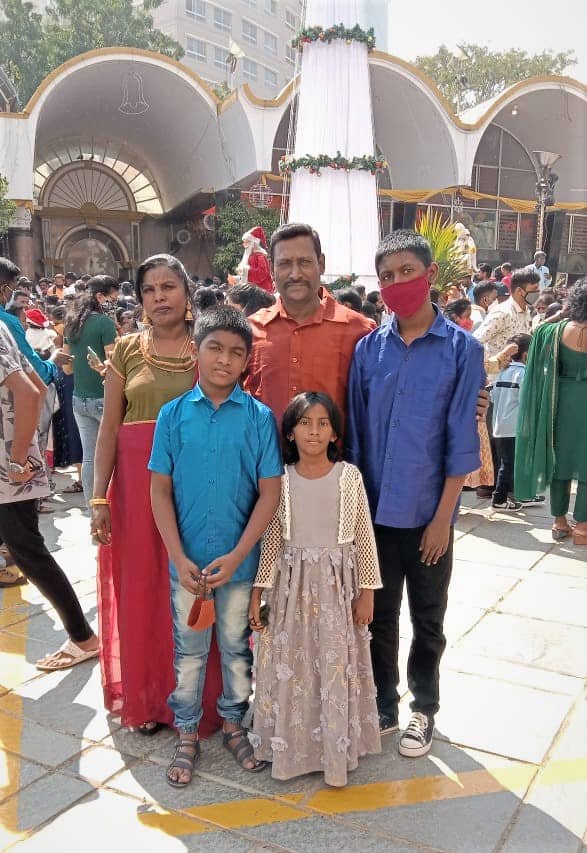
Annaji Rao works with a group of alteration tailors who sit near Yeshwanthpur Railway Station. Though he started 15 years ago, his income is just about sufficient for his family of 4, including 2 children. In spite of having to consolidate in a competitive space, the group of tailors worked together to attract every customer on that street. Even the sewing machines are taken on rent. His income ranges from Rs 200 to Rs 500 per day. Although he continued to occupy his workspace after the lockdown ended, the earnings took a hit. Many of his fellow tailors left for their villages but he stayed. His leased accommodation saved him from the burden of the monthly rent.
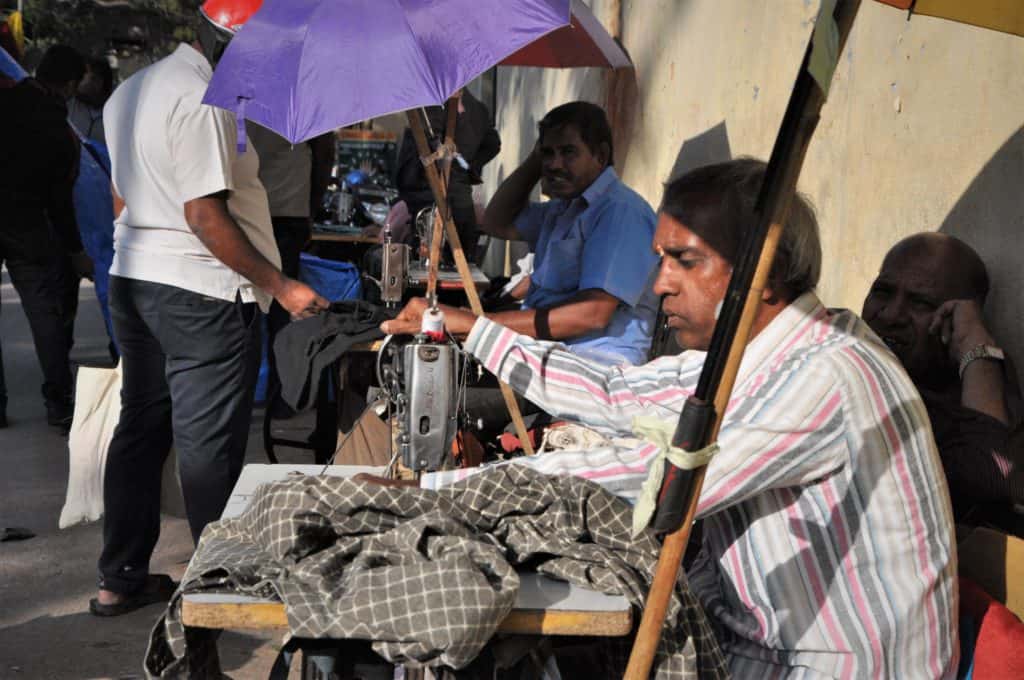
Their native is the city
Many informal workers stayed on and tried to scrounge a living here in the city. The village for many was a place of abject poverty and lack of resources.
Sridhar the mobile tailor’s home town in Vellore district in Tamil Nadu, is a very poor place. There was never a possibility of him going back to seek shelter there. Sridhar was born in Bengaluru and studied till 12th class. He speaks Tamil, Kannada, English, and Hindi for the purposes of his clientele. His only earning opportunity is in the city.
Suresh, who had gone to his village in Tamil Nadu when the lockdown was stuck there. His father-in-law’s house in the village is just sufficient, with ample open space for his children to play. His father-in-law is a pensioner who helps look after Suresh’s children in the village, while Suresh himself struggles to get his business back in the city.
Annaji avoided a trip to his village. The roof of his house in the village crumbled during the last monsoon. He confides any trip back to their villages is looked upon suspiciously, as they are believed to be carrying the COVID infection.
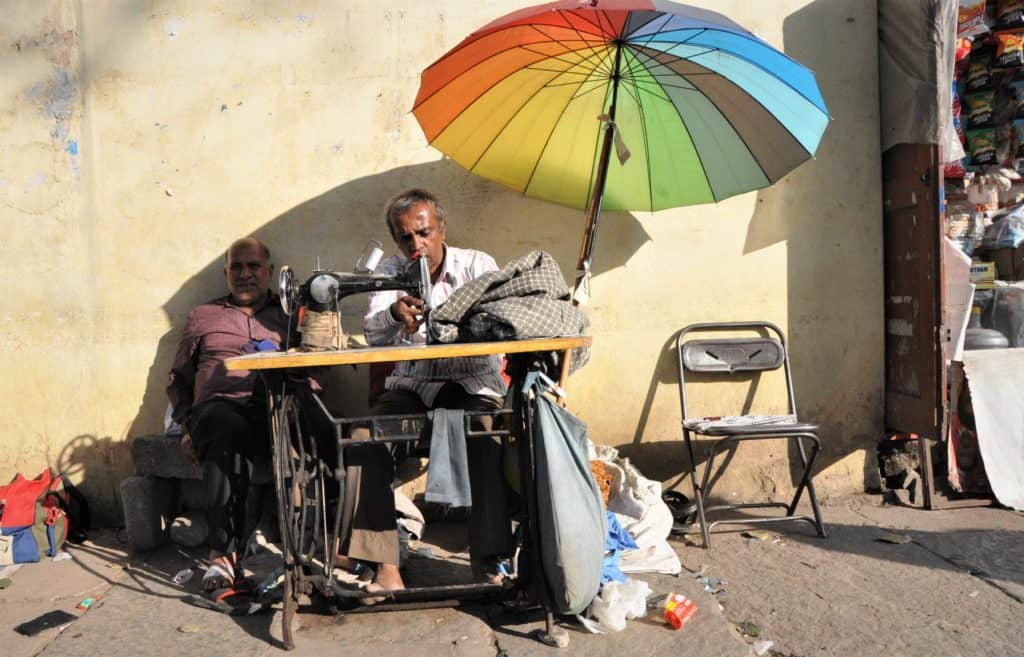
Community came to rescue, not only PDS
Many of the informal workers are registered with the government Public Distribution System or availing pensions. But a huge help came from individuals, NGOs and religious institutions like mosques, churches and temples.
Sridhar, the mobile tailor, has a ration card from which he was getting 25 kgs of rice. About the rice, he says that it was suitable only for making dosa and idli. The community helped his family survive through the lockdown, he says.
Balamurugan, the steel almirah maker, has a Jan-dhan account. He lives in a rented house in the Pete area of Bengaluru and his landlord and neighbours helped him through the tough times. He depended on rations during the lockdown and he was able to ensure his child continued in school.
Read more: COVID-19 lockdown: Is universalising PDS the need of the hour?
Jabbarbhai, who repairs umbrellas, keys and locks, says there were organisations coming to his neighbourhood in Mathikere to distribute rations, vegetables and milk during the lockdown. He receives a small pension from the Indira Gandhi Senior Citizen Pension Scheme. He was also quick to open an account with a bank that offered a one-time payout of Rs 20,000 on opening an account during the lockdown period.
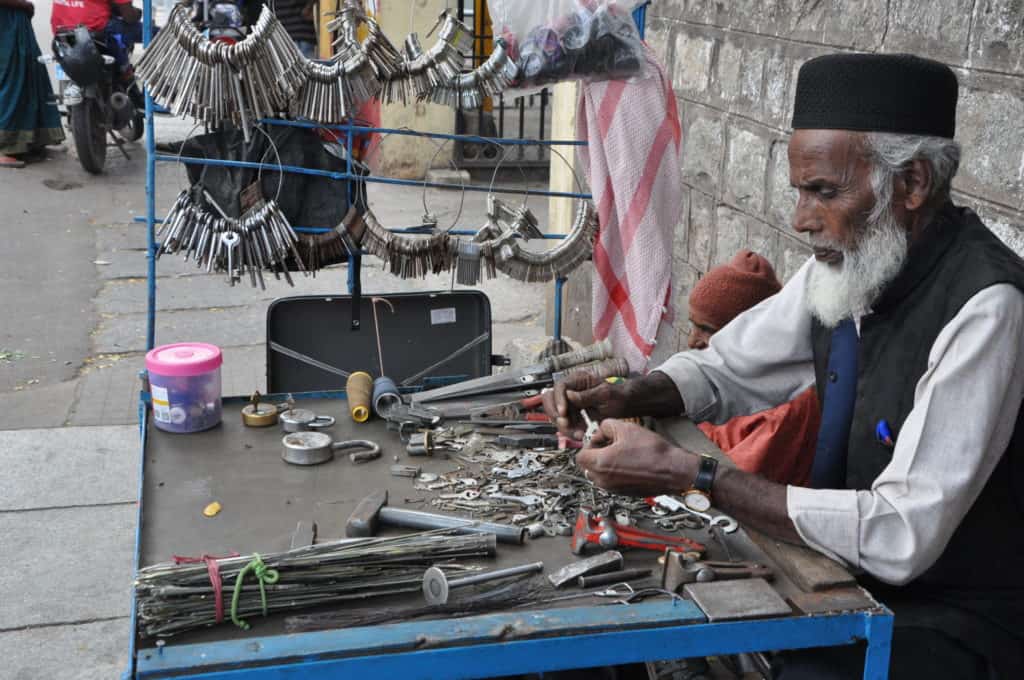
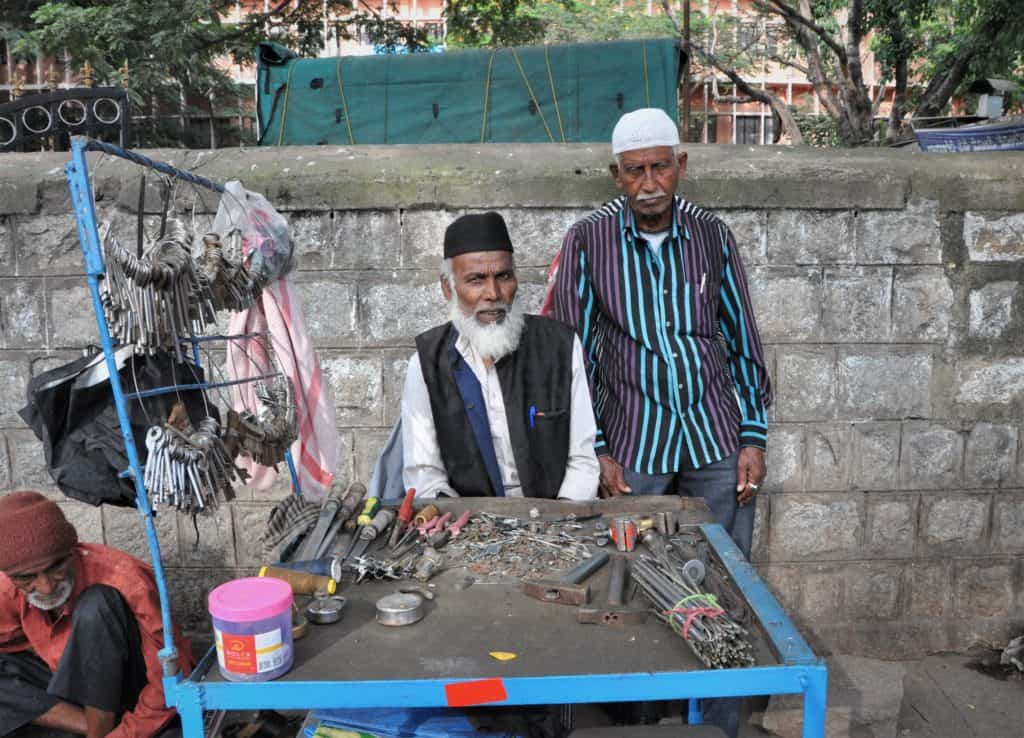
Rebuilding and persistence
Even today the business is not back to the pre-lockdown levels. In the days after the lockdown, finding transport itself was difficult. Customers were more afraid of the spreading infection in the days after the lockdown.
Sridhar the mobile tailor, has a wide range of skills such as stitching pants-shirts or kurta-pyjama or saree-blouses, children’s clothes and frocks, pillowcases, pillow covers, cushion covers, jeans pants, cotton pants as well as alterations. He says his business is yet to pick up. He is paying a loan of Rs 50,000 and is optimistic that business will soon get back to pre-lockdown levels.
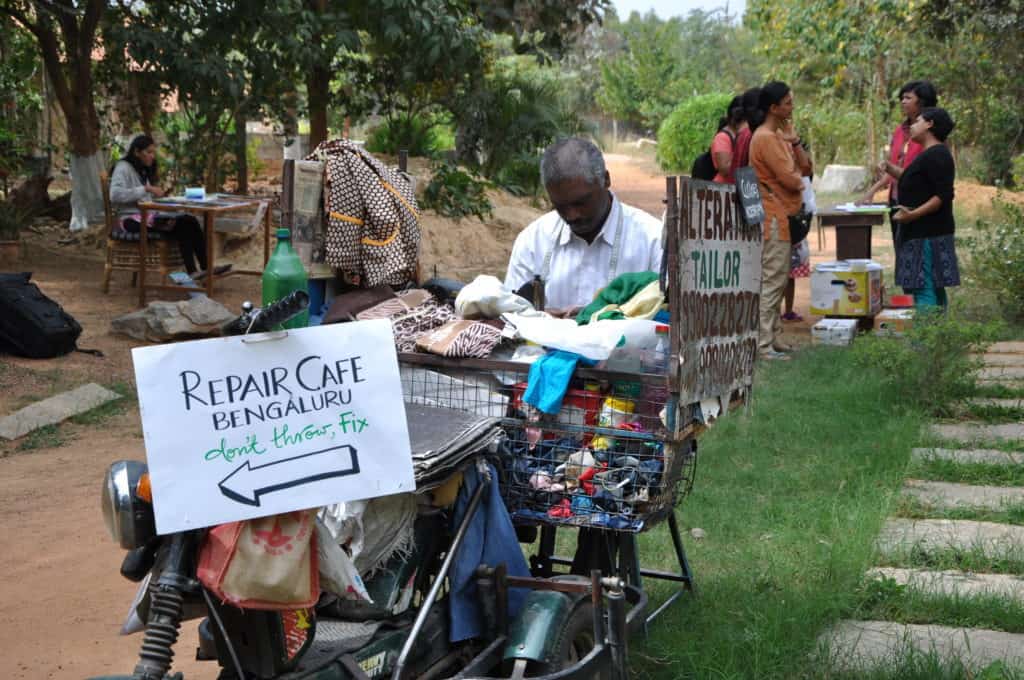
Harish the key-maker decided to shift back to the footpath from a shop he had rented before lockdown. In his shop on Banashankari Stage 2 market, he could charge more for his work. His dreams of having a shop like his father were held-up during lockdown but his dexterity bailed him out from the mess. With the rent pilling at Rs 15,000 per month, it was impossible to pay for the shop. After three months, he paid his dues with a loan and moved back to the footpath. Harish is young and hopeful of living his dream one day.
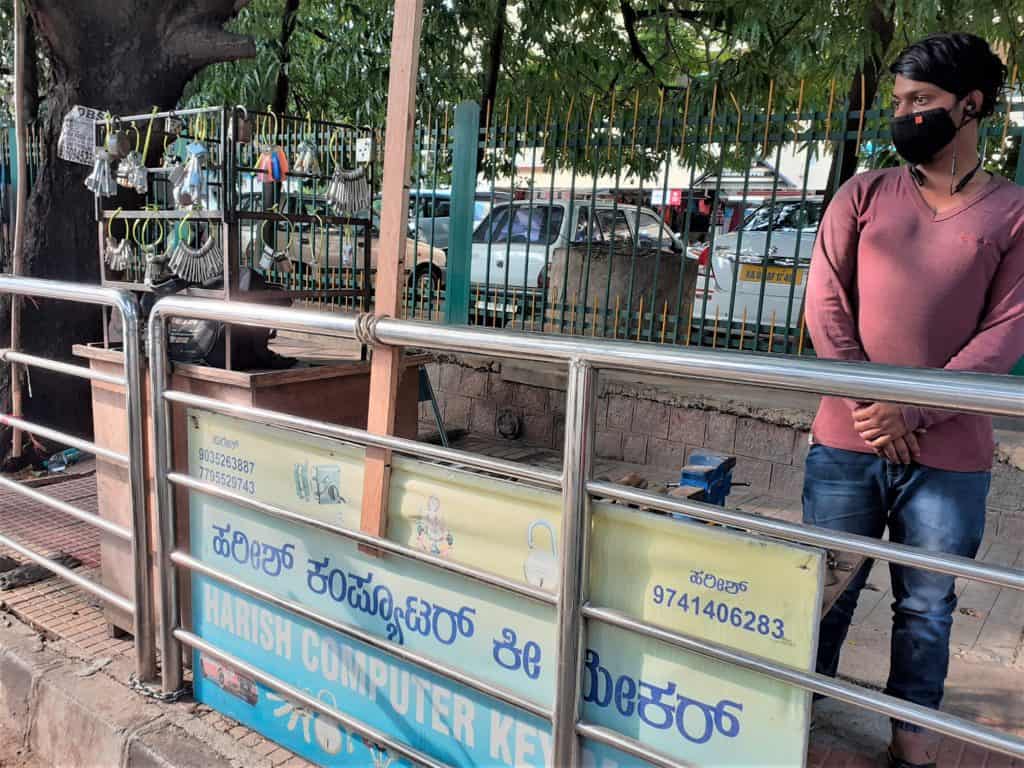
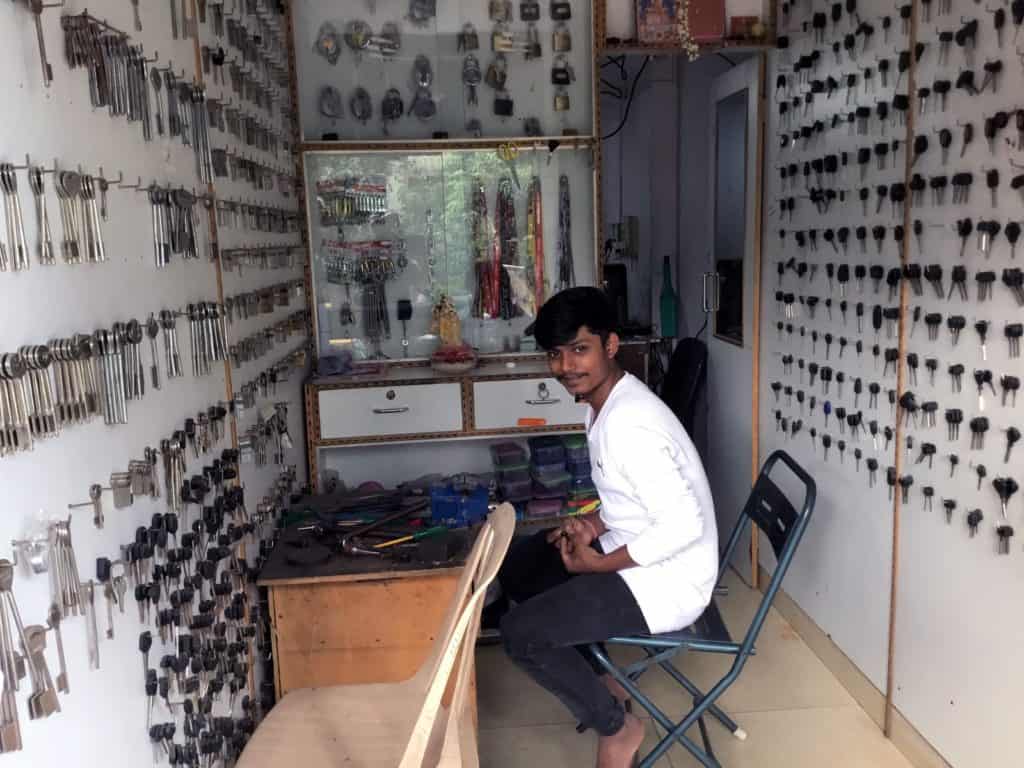
Suresh, Jabbarbhai, Annaji, Balamurugan and Kodandaraman are all apprehensive about their businesses getting back to their pre-lockdown times. They think it could take a year to return to normalcy. Meanwhile, the jobs they are doing today are necessity based. Their main clientele were the migrants from other states and those people have still not come back to the city. But the Economic Survey 2021 paints a different picture.
Great Article. . Urban people do not have mindset of repair. . From this article, came to know how Pandemic affected the repairers. . They should not give up. . Repairers are needed for Earth. . I will continue to support.
Revealing article. The government should use some of the money collected from the fuel taxes to set up well organized spaces and facilities to create a repair plaza to encourage these tradesmen and also make it attractive for us to go to them instead of having to use the footpaths.
The article brings to light the genuine plight of repair workers occasioned by the pandemic.
They deserve every help and encouragement.
However, from the perspective of Repair Cafe advocate, the real issue facing the world is that there is ever shrinking canvas of repair business opportunies caused by “use and throw” philosophy promoted by every limb of the economy, be they manufacturers, bankers, comfortable middle and upper classes or even political class. Everyone is running after ever increasing growth rates to the detriment of earth resources and environment posing the biggest threat to existence. The answer is to stop, turn, and find a new sustainable path to healthy existence.